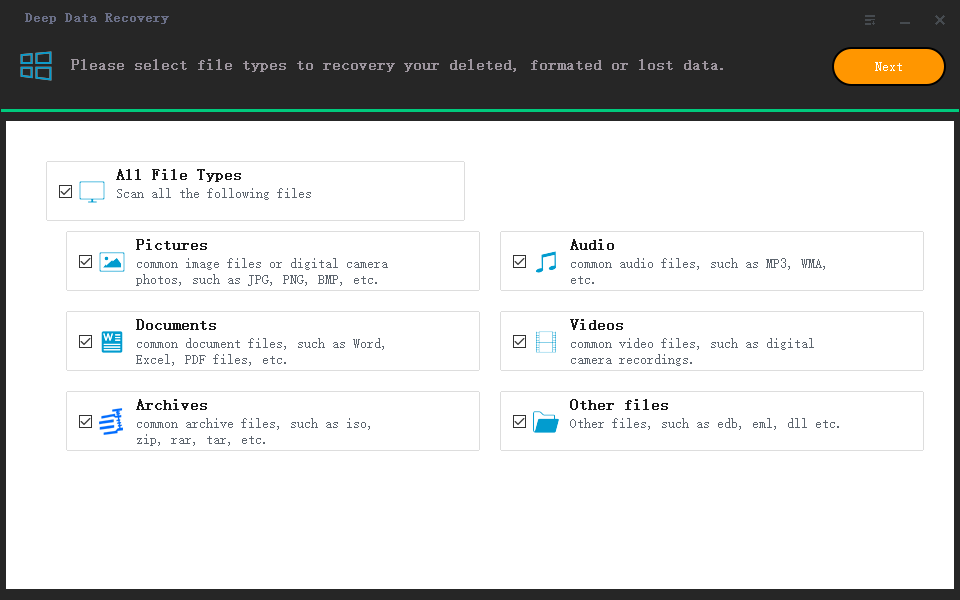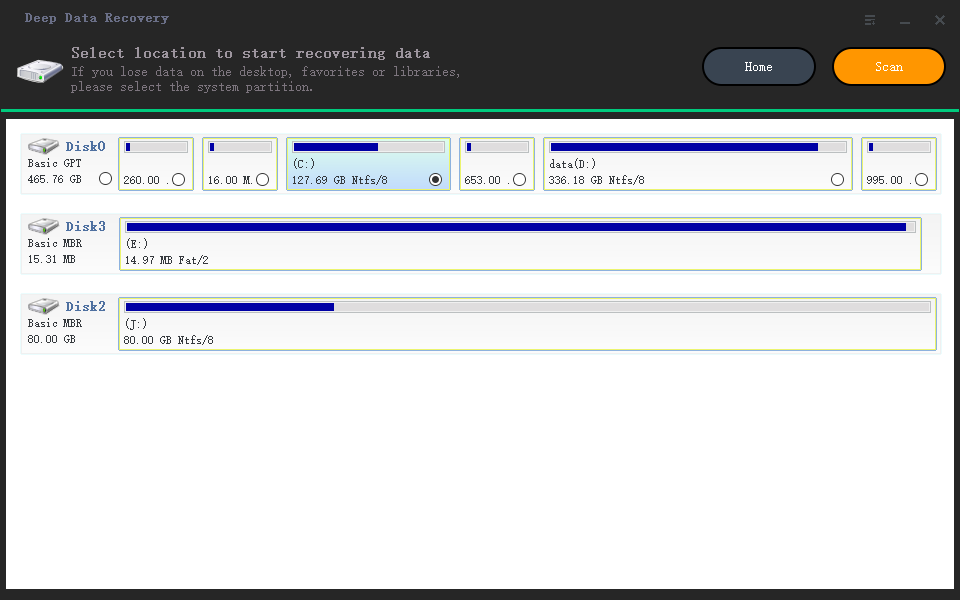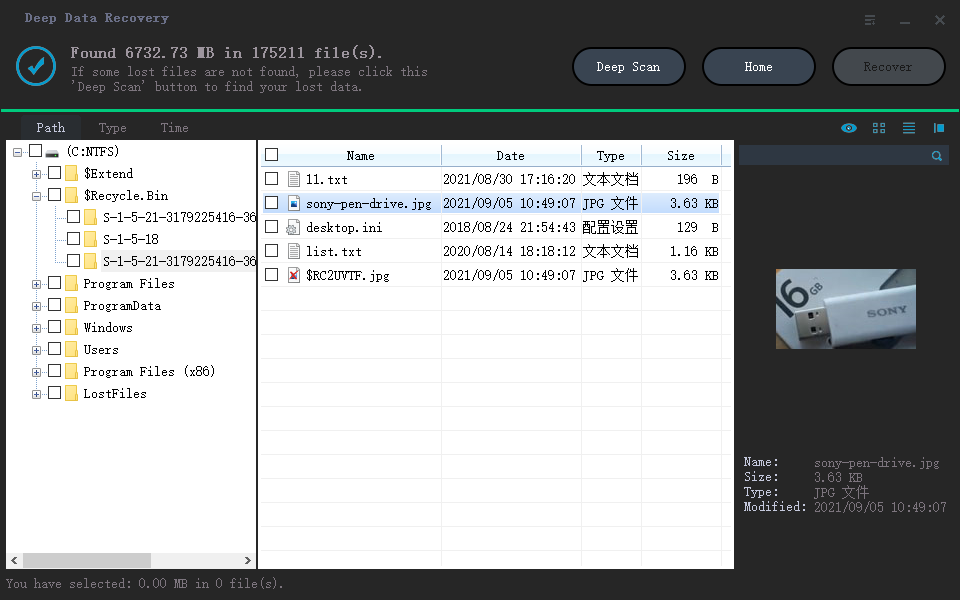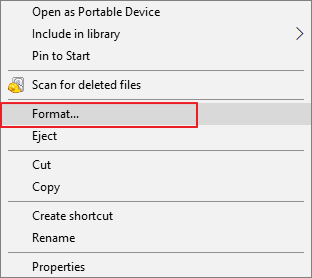How to Convert RAW to NTFS Without Losing Data
If a hard disk or partition suddenly goes RAW, making its data inaccessible, a basic solution is to convert RAW to NTFS. This can be done using a file recovery program like Deep Data Recovery, which can help recover data from the RAW disk or partition and convert it to a usable NTFS format.
What Does RAW File System Mean?
When an external hard drive, USB flash drive, or partition becomes RAW, it suggests one of three scenarios: the drive is corrupted, there's a problem with the file system, or it's been formatted, causing the data to be inaccessible. This situation often arises due to a power outage, improper shutdown, or a software issue.
- Your computer's operating system can't recognize the file system of the disk.
- There is no file system on your disk
- The file system of your hard drive or partition is damaged
Windows supports various file systems, including FAT, NTFS, exFAT, Live File System, and ReFS. If you connect an external hard drive that uses the AFPS file system, however, your Windows computer will recognize it as RAW, rather than one of the supported file systems.
Notifications of Hard Drive/Partition Becoming RAW
You can use the properties or Disk Management to check if your external hard drive or USB flash drive has a RAW file system. However, you may notice it's about to become RAW when you see notifications on your computer, such as the file system being corrupted or the disk being in an unknown state.
- "You need to format the disk in drive X before you can use it."
- "The disk in drive X is not formatted. Do you want to format it?"
- "Drive X: is not formatted or accessible. Please check if it's properly connected and if the issue persists, you might need to reformat the drive."
- "The type of the file system is RAW, and CHKDSK is not available for RAW drives."
Why Do You Need to Convert RAW to NTFS?
To repair a RAW disk and convert it to NTFS without losing data, you can use a data recovery software like EaseUS Data Recovery Wizard. This software can scan the RAW disk, identify the recoverable files, and save them to a safe location. Once the files are recovered, you can safely format the RAW disk to convert it to NTFS, ensuring that your data is preserved. This approach allows you to recover your data and then format the disk, effectively converting the RAW disk to NTFS while maintaining the integrity of your files.
You can't convert a RAW drive to NTFS or any other file system because it's inaccessible, making it impossible to back up your data. The files on the drive are lost if you try to convert it. You can't even open the folders to copy your files. This makes it difficult to recover your data.
Luckily, all hope is not lost. There's a way to back up the files from your inaccessible RAW drive before you format it.
How to Convert RAW to NTFS Without Losing Data
You can convert RAW to NTFS without losing data by first recovering data from the RAW drive and then formatting it to NTFS.
# 1. Restore Data from the RAW Hard Drive/Partition
To recover files from a RAW drive, you can use a tool like Deep Data Recovery, which is a professional hard drive recovery software that fully supports RAW file recovery on various storage devices.
The tool works on Windows 11/10/8/7/Vista.
To perform RAW disk/partition recovery:
To recover lost files, install deep data recovery software on a different disk, not the RAW disk where the files were lost.
Step 1. Launch the deep data recovery software. From the main window, please only keep the file types you want to recover checked and selected. By default, all supported files are selected. Click "Next" to begin.

Step 2. Locate the RAW drive with its original drive letter and then click "Scan". If the RAW drive has lost its label, it will be detected as "Lost Partition", select it and click "Scan".

The program will automatically scan all lost files and data on the RAW drive, allowing for a comprehensive recovery process.
Step 3. When the scan process is complete, you can find lost RAW drive data in the "Other Lost Files" or "Files Lost Original Name" sections. Additionally, the "Filter" and "Search" features allow you to easily locate specific types of files.

You can double-click a file to preview it.
Step 4. Select the desired files from the RAW Drive, click "Recover" to save them to a new location, and then click "OK" to initiate the recovery process.
The Quick Scan is used first, but if the target files are not found, the Deep Scan should be tried instead, as it scans more thoroughly and carefully to help locate the lost files.
Qiling can recover data from various data loss scenarios, including virus infection, formatted file recovery, lost partition, and more, in addition to recovering RAW files.
Let's get to formatting your RAW drive. There are multiple ways to do this and select anyone you'd like to use.
# 2-1. Convert RAW to NTFS by Formatting
Step 1. Open This PC (Windows 10), right-click the RAW disk/partition, and choose Format.
Step 2. Select the NTFS file system and configure other options.
Step 3. Select Start followed by OK.

When the process is done, your hard drive or partition is usable again. You can copy the files recovered in the first step back to the disk according to your needs.
# 2-2. Convert RAW to NTFS via CMD
To convert a RAW hard disk or partition to NTFS using Command Prompt, you can use the command `convert` followed by the drive letter of the RAW disk or partition. For example, if the RAW disk or partition is assigned the drive letter `D`, you would use the command `convert D: /fs:ntfs`. This command will convert the RAW disk or partition to NTFS.
Step 1. Open the Start menu, search for Command Prompt, and choose Run as administrator.
Step 2. Type convert X(driver letter): /fs:ntfs and hit Enter.
Step 3. Type the name of the partition or disk you want to convert to NTFS and press Enter.
To convert a RAW disk/partition to NTFS, you simply need to wait for the process to finish, and once it's done, your RAW disk/partition should now be utilizing the NTFS file system.
Bottom Line
To summarize, you can't directly access a RAW drive to copy files for data recovery, but you can use a data recovery program to back up your files and then convert the RAW drive to NTFS.
FAQs About Converting RAW to NTFS
If you have further questions about the RAW to NTFS conversion, the following series of questions and answers might be helpful to you.
1. How can I convert my raw hard drive to NTFS without losing data?
To convert a RAW hard drive to NTFS without losing data, first recover your data using a tool like Deep Data Recovery, and then format the drive to NTFS using one of the methods outlined in this guide.
2. How can I convert RAW to NTFS?
To convert a RAW drive to NTFS, you can either use a CMD command or format the drive in Disk Management/File Explorer.
Here's how to use Disk Management to format the drive:
Step 1. Open Disk Management and find your RAW storage devices (SD memory card, hard disk, USB flash drive, etc.)
Step 2. Among the volumes, right-click on your device. Select the format and the file system (NTFS).
Step 3. Click OK.
3. How do I fix a raw external hard drive without formatting?
If you don't want to format a RAW external hard drive, you'll need to convert it using the Command Prompt. To do this, follow these steps: right-click on the drive in File Explorer, select "Properties", then click on the "Tools" tab; click on "Check" to scan the drive for errors; if any errors are found, click on "Scan and repair" to fix them; if the drive is still RAW, go to the Command Prompt and type "chkdsk /f /r" followed by the drive letter (e.g.
Step 1. Connect the RAW external hard drive to your PC.
Step 2. Click Start and search command, then right-click on it and afterward click Run as Administrator.
Step 3. Type in Diskpart and then press Enter.
Step 4. Type the following command and hit Enter each time:
- list disk
- select disk * ( replace * with the drive letter of the RAW device)
- clean
- create partition primary
- format fs=ntfs (or format fs=FAT32)
- assign letter=* (replace * with a new drive letter)
4. How do I recover data from a raw hard drive?
When a hard drive becomes RAW, it can't be accessed by simply double-clicking it in File Explorer because Windows doesn't support the RAW file system.
If your computer detects a RAW drive, it's likely that you can recover data from it using a tool like Qiling, which may be able to retrieve all files stored on the drive.
Related Articles
- Adata Flash Drive Recovery Tool Free Download for 2021
- What Happens to the Data on an SSD When the Power Is Lost?
- [Self-Check-and-Repair]: How to Repair External Hard Disk Not Detected in Windows 10
- Fixes for The Type of the File System Is RAW, CHKDSK Is Not Available for RAW Drives
- Fixed: USB Flash Drive Not Showing Up in Windows 10/11